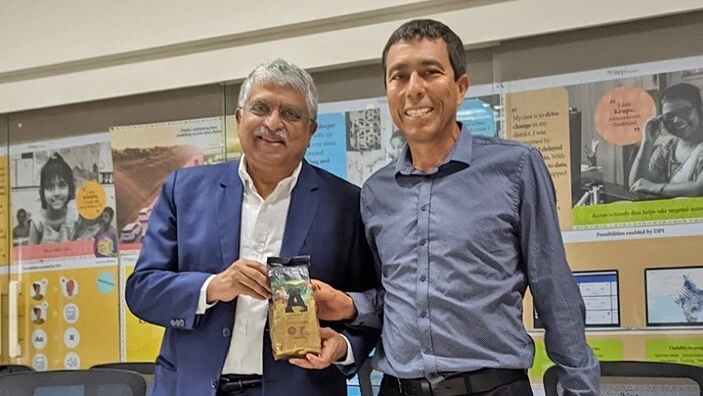In emerging markets and lower-income countries frugal innovation can help enable accessibility and inclusion for Artificial Intelligence (AI).
“The principles of frugal AI apply to both high-income and lower-income countries,” says Serish Venkata Gandikota, Co-Director of the Frugal AI Hub and a Visiting Fellow at the Centre for India and Global Business. “For developed economies frugal AI can be practiced through lower-carbon infrastructure for AI, while in emerging markets and lower-income countries frugal innovation can help enable accessibility and inclusion for AI.”
A White Paper issued by the Frugal AI Hub, outlining its mission and principles, identified 4 interconnected pillars underlining its work:
1
Resource efficiency
Focused on minimising consumption of energy, computational power, data and financial capital throughout the AI lifecycle.
2
Sustainability
Emphasising reduction of the AI carbon footprint through energy-efficient model training.
3
Accessibility and inclusion
By democratising access to AI capabilities including through lighter-weight models.
4
Impact and scalability
Allowing scale without massive infrastructure investment.
An AI Self-Assessment Framework outlined in the White Paper allows firms to evaluate how they are applying frugal AI to data centres and ecosystem engagement.
AI has huge potential to amplify frugal innovation’s impact
As we integrate AI into our lives and systems, we must ensure that it aligns with the principles of frugality: accessibility, affordability and sustainability.
“Frugal innovation is not just about cost-cutting; it is about reimagining processes, products, and systems to create value under constraints,” says a Foreword to the White Paper by Jaideep Prabhu, Jawaharlal Nehru Professor of Indian Business and Enterprise at Cambridge Judge and Director of the Centre for India and Global Business, who has written 2 books on frugal innovation.
“Artificial Intelligence, a transformative force of our time, holds immense potential to amplify the impact of frugal innovation. However, as we integrate AI into our lives and systems, we must ensure that it aligns with the principles of frugality: accessibility, affordability, and sustainability. This is where frugal AI emerges as a groundbreaking concept – AI designed not just for efficiency but for equity.”
Earlier this year, the Frugal AI Hub and the United Nations International Computing Centre (UNICC) developed a 3-level measurement framework that links total cost of ownership, return on investment and the UN Sustainable Development Goals, helping organisations evaluate AI portfolios across financial, technical and societal dimensions.
“The authors propose in this paper a comprehensive set of metrics to measure AI portfolios as strategic organisational assets,” the framework concludes. “The framework is designed to be future-proof. As AI paradigms evolve – such as agent-based systems, task-level ROI measurement and the increasing role of synthetic data – the approach can adapt to remain relevant and effective. This flexibility allows organisations to continue measuring and managing AI portfolios as living assets, aligning financial returns with broader sustainability and inclusion objectives.
“Measurement should lead to optimisation processes that maximise the value of the AI portfolio over time, while also demonstrating alignment with the UN Sustainable Development Goals. Our general approach is designed to be extended to other organisations. At the Frugal AI Hub, we will continue to gather feedback from organisations interested in piloting the framework, with the goal of refining metrics, sharing playbooks for adoption, and building an ecosystem of practice around Frugal AI.”
Follow-up White Paper seeks to expand AI access
A follow-up White Paper issued by the Frugal AI Hub in conjunction with the COP30 climate-change summit in November – Accelerating a frugal AI ecosystem – says that frugal AI is a way to address an imbalance between AI’s technical progress and economic viability given the huge cost of developing AI infrastructure.
The new White Paper proposes a Frugal AI Technical Stack that combines compression with efficient hardware and open standards, aiming to achieve “substantial reductions in total cost of ownership (70%-90%) and energy use (up to 80%) without compromising model utility”. It also defines a Socio-Economic Stack that links cost efficiency to social inclusion and equitable access to AI infrastructure.
“By lowering barriers to participation, Frugal AI extends innovation to communities, small enterprises and public institutions previously excluded by high compute costs,” says the new White Paper.
Many startups are developing new ideas in the AI infrastructure space that increase efficiency and reduce energy consumption: we are bringing them together in the notion of a Frugal AI stack.
We aim at creating an ecosystem of new developments in this space.
The pioneering work on frugal innovation at Cambridge Judge Business School includes 2 books on the subject co-authored by Jaideep. In a 2012 book, Jugaad Innovation: Think Frugal, Be Flexible, Generate Breakthrough Growth, he focused on frugal innovation in developing countries such as India, and then examined use of the same techniques in Western economies in a 2015 book entitled Frugal Innovation: How to Do More With Less.
Featured research
Frugal AI Hub, and UNICC AI Hub (2025) “From total cost of ownership to social impact by Frugal AI Hub and UNICC AI Hub” White Paper
Sathiaseelan, A., Gandikota, V.S., Osta, E. and Prabhu, J. (2025) Accelerating a frugal AI ecosystem.
Gandikota, V.S. and Osta, E. (2025) Frugal AI: driving sustainable, inclusive, and scalable innovation.









